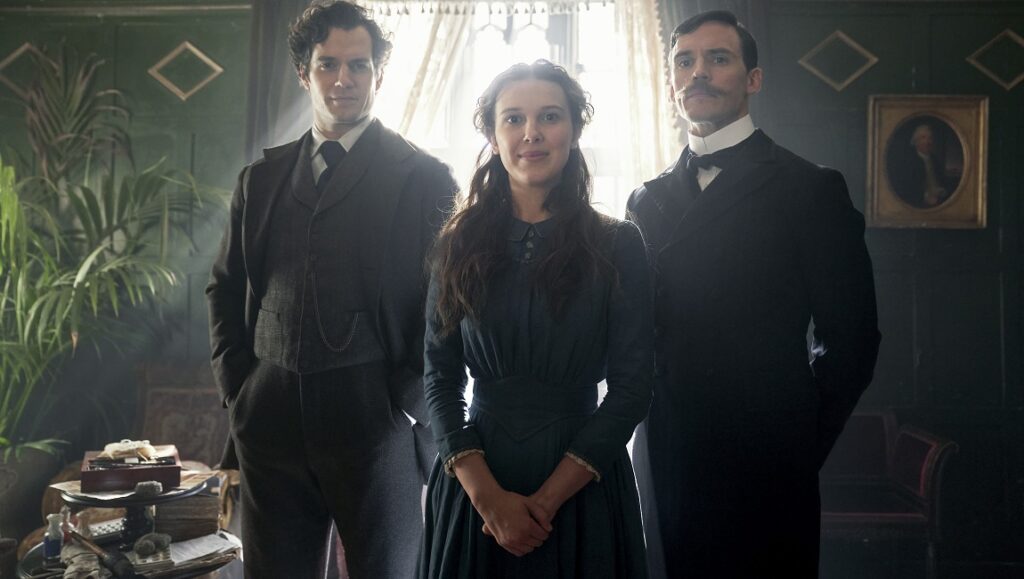Enola Holmes is a cartoon. Or perhaps the problem is that it should have been. The film follows the title character (played by Stranger Things’ Millie Bobby Brown), Sherlock Holmes’ teenaged sister, as she attempts to solve the mystery of her missing mother and finds herself caught up in governmental conspiracy. From the film’s first moments, ushered in by bouncy musical cues that establish its committed jocularity, it becomes evident that Enola Holmes will consist of little more than trivialized stakes and schmaltzy relationships, lacking the narrative complexity typically found in such old-timey procedurals. And, mostly, that is how the film develops. There are a few interesting fillips: mothers turn out to be violent political revolutionaries, a genteel hitman (played by Burn Gorman, who consistently applies a thin-lipped smirk to express both Dickensian severity and smarm as he chases around a child) tries to first drown and then brain Enola with the butt of his shotgun, and there’s an attempted garroting of a young, idealistic nobleman who also happens to be Enola’s obligatory love interest. The problem is that none of this is ever organically built or maintained; in between these moments of tonal whiplash, director Harry Bradbeer spotlights a bunch of mediocre martial arts sessions, employs some lazy visual gimmicks to establish shared familial genius (letters rearrange and messages are decoded on screen), and leans on a number of winking fourth-wall breaks in which Enola talks to and even solicits advice from the viewer. It’s entirely unruly, and just when there appears to be a glimmer of what this slapstick-comedy of manners hybrid might look like if properly executed, a jaunty rhythm announces the next inane, detective-specific jollity.
As a children’s film, which Enola Holmes certainly is by any structural or intellectual measure, this could all pass as a bit of trifling fun (excepting, of course, the out-of-place threats of brutal violence). The bigger issue, then, is the film’s entirely artless and facile feminist gloss. It’s perhaps too much to ask of a film with such an intended audience — the film is based on a middle grade book series and the film will be most appealing to a similar demographic — but Bradbeer and company also go to great, heavy-handed lengths to make this the central conceit of Enola Holmes. And it makes sense, empowering the younger sister of such a legendary male character, and even allowing her to outwit him on her first try. Enola is a character built to inspire young girls, and that’s precisely what makes it unnecessary to lay it on so thick. In one scene, Enola is forced by Mycroft to move into a finishing school, where she is promptly imprisoned in her room, literally under lock and key and guard, before a quick cut finds her struggling to lace up an impossibly restrictive corset. Later, after escaping by stuffing herself inside a large delivery container, she announces, “I didn’t like it in there.” Add to that some bandied throwaway exposition about Enola’s revolutionary mother and an upcoming Reform Bill vote (which does play a major role in the story, but adds little substance to it), and it’s evident that these moments exist not to create depth, but to give only the barest suggestion of it. Were all this handled with any of the same wink-nudge playfulness of the rest of the film, perhaps they could be considered part and parcel with the brand of Nancy Drew feminism the film is selling; but as executed, they are simply ways to avoid having to meaningfully develop the film’s chosen milieu. Brown is the film’s undeniable strength, hamming it up with boundless charm, and Bradbeer rightly lets the film coast on the force of her swagger, but it’s really the only element that works. The central “mystery” is handled with extreme lassitude, without any dynamic twists or “a-ha!” reveal; even moments apparently meant to demonstrate Enola’s ingenuity — such as when she crosses to the other side of a hallway to confuse her pursuer — fall thuddingly flat. The whole affair isn’t much more than opulent Victorian cosplay and shallow, protofeminist virtue signaling. Enola Holmes is ultimately the kind of film that would have been better suited as a new Nickelodeon pilot.
You can currently stream Harry Bradbeer’s Enola Holmes on Netflix.


Comments are closed.